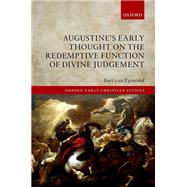
Augustine's Early Thought on the Redemptive Function of Divine Judgement
by van Egmond, BartBuy New
Rent Textbook
Rent Digital
Used Textbook
We're Sorry
Sold Out
How Marketplace Works:
- This item is offered by an independent seller and not shipped from our warehouse
- Item details like edition and cover design may differ from our description; see seller's comments before ordering.
- Sellers much confirm and ship within two business days; otherwise, the order will be cancelled and refunded.
- Marketplace purchases cannot be returned to eCampus.com. Contact the seller directly for inquiries; if no response within two days, contact customer service.
- Additional shipping costs apply to Marketplace purchases. Review shipping costs at checkout.
Summary
Bart van Egmond follows the development of Augustine's early thought on judgement and grace from the Cassiacum writings to the Confessions. The argument is contextualized both against the background of the earlier Christian tradition of reflection on the providential function of divine chastisement, and the tradition of psychagogy that Augustine inherited from a variety of rhetorical and philosophical sources. This study expertly contributes to the ongoing scholarly discussion on the development of Augustine's doctrine of grace, and to the conversation on the theological roots of his justification of coercion against the Donatists.
Author Biography
Bart van Egmond is a minister at the Reformed Church (liberated) in Capelle aan den IJssel, the Netherlands. His doctoral studies were conducted at Kampen Theological University and the Catholic University of Leuven.
Table of Contents
1. Introduction
2. Cassiciacum: The Discipline of Fortune and Dialogue
3. God's Pedagogy of the Embodied Soul: Augustine before his Ordination (387-391)
4. Reappropriating Paul and Exercising Discipline: Augustine During his Presbyterate (391-397)
5. Confessions: God's Lawsuit with Augustine between the Deferral and the Reception of Baptism
6. Conclusions
Bibliography
An electronic version of this book is available through VitalSource.
This book is viewable on PC, Mac, iPhone, iPad, iPod Touch, and most smartphones.
By purchasing, you will be able to view this book online, as well as download it, for the chosen number of days.
Digital License
You are licensing a digital product for a set duration. Durations are set forth in the product description, with "Lifetime" typically meaning five (5) years of online access and permanent download to a supported device. All licenses are non-transferable.
More details can be found here.
A downloadable version of this book is available through the eCampus Reader or compatible Adobe readers.
Applications are available on iOS, Android, PC, Mac, and Windows Mobile platforms.
Please view the compatibility matrix prior to purchase.
